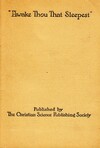Lions in the path
Originally published in August 26, 1916 issue of The Christian Science Monitor
There are few things more fatal to successful demonstration than discouragement. It is, of course, a form of mental weakness nourished on ignorance and materiality. Mrs. Eddy makes this very clear, onpage 329 of Science and Health, when she writes, "To be discouraged, is to resemble a pupil in addition, who attempts to solve a problem of Euclid, and denies the rule of the problem because he fails in his first effort." Yet a great number of people who turn, for one reason or another, to Christian Science, fall into this particular "Slough of Despond." It lies, as Bunyan pointed out long ago, between every man and Principle, though he put it a little differently. The narrow way drives right through its midst, and the pilgrim will have to sink the fascines of endurance and understanding, tinder his feet, every inch of the road, if he is to reach the other side, and, even then, when he reaches the "Wicket Gate," he will find it a veritable needle's eye, whilst his own material dimensions are still those of the camel.
Paul summed the whole thing up many times in his letters to the Christian churches, for Paul in his struggle from sense to Soul had to meet and master all the lions which prowl along this particular path. The writer of Proverbs confined the expression, of course, for his own purpose of illustration, to one peculiar phase of the materiality of the human conciousness: "The slothful man saith, There is a lion in the way; a lion is in the streets," an epigram the man in the street himself has converted into the homely proverb, "Lions in the path." All the same no one knows better than the man in the street that slothfulness is only one of the many lions which roam in the streets of the city of "Good Intent," and produce discouragement of every description. Slothfulness itself is nothing but the mesmerism of the disinclination of the individual, mentally, to bestir himself, and the more material the individual outlook becomes, the greater becomes the disinclination to use the mental faculties. The more the individual permits his thought to travel along material, and therefore sensual, lines, the more real matter becomes to him, and the less real, consequently, the power of the human mind as well as the divine Mind. What is commonly known as a bovine mentality is only a mentality governed supremely by a belief in the reality of matter, and in a corresponding extinction of mind. Such a mentality necessarily and naturally produces slothfulness, and this slothfulness manifests itself in the disinclination to in any way exert the mentality. When such a condition is reached the human mind begins immediately to find excuses for its own inaction, and these excuses are the lions in its path.
Now once a man is beset by these lions he frequently leaves the street clear to them, and seeks refuge in his house. In other words, having found a reason for not exerting himself, he becomes more and more reconciled to his surrender to matter, and gradually he approaches the mental condition when any exertion is a terror to him, because some lion or another roars at his appearance in the street. After a time the lions, so far from becoming a terror, become his chief argument for a slothfulness which has become not only natural but delightful to him, and he resents to the full the idea, put forward by his neighbors, that if he would face the lions resolutely they would run, and if he pursued them, they would disappear. Instead of that he prefers to go on sleeping in his house, not perceiving that this very wish for sleep is the mesmerism which ultimates in what is known as death. "Sleep and apathy" writes Mrs. Eddy, onpage 249 of Science and Health, "are phases of the dream that life, substance, and intelligence are material." Jesus made this quite clear, to the disciples, when he told them that Lazarus slept. To the man who taught daily in the temple, and who by night abode on the Mount of Olives, death was nothing but a prolonged sleep of the human mind. The disciples, less metaphysical than their Master, declared that if Lazarus slept, he would do well, but Jesus knew that sleep, though actually a necessity to the human consciousness to the exact extent in which that consciousness believes in matter, was, none the less, like every other material phenomenon, however legitimate from a human point of view, a surrender to that sense of apathy which, as Mrs. Eddy says, is founded on the belief that life, substance, and intelligence are material.
Enjoy 1 free Sentinel article or audio program each month, including content from 1898 to today.



